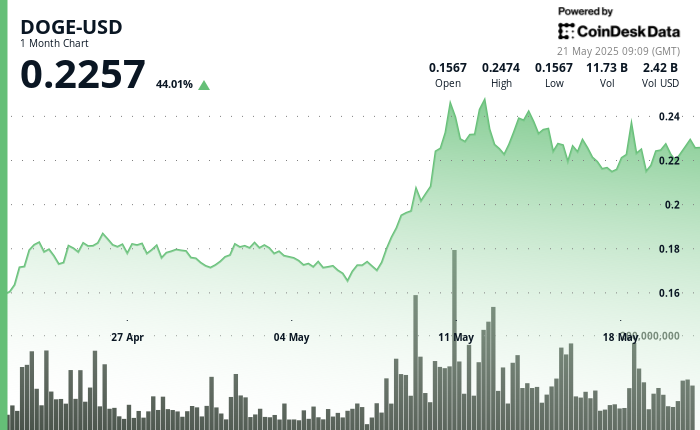
Lido has suffered multiple months of outflows as liquid restaking protocols grow.
Lido, the leading Ethereum liquid staking protocol, wants to foster new restaking architecture built around its stETH token.
On May 13, Steakhouse Financial, a web3 financial advisory firm, published a proposal advocating for establishing the Lido Alliance to endorse “Ethereum-aligned” projects through an “umbrella framework for endorsement and partnership.”
The alliance would focus on restaking by promoting the development of infrastructure built around Lido’s liquid staking token (LST), stETH. Steakhouse outlined three types of protocols that the alliance seeks to promote, including new projects providing permissionless restaking architecture, building permissionless restaking tokens (LRTs), or developing actively delegated services (AVSs).
“Lido Alliance is a framework… for Lido DAO to identify and recognize projects that share the same values and mission, and have a way to positively contribute to the stETH ecosystem,” the proposal said. “Growing an Ethereum-aligned ecosystem around stETH helps decentralize the network.”
If passed, Lido would establish an Alliance workgroup tasked with assessing prospective members, assisting existing members, and offboarding members deemed to be violating the alliance’s principles of Ethereum or stETH alignment.
The Alliance’s operations and membership would be governed by LDO tokenholders.
Lido suffers outflows as LRTs rise
The proposal comes as Lido faces stiff competition from liquid restaking token (LRT) protocols and EigenLayer for market share over staked Ethereum.
Restaking allows users to earn additional yields on top of Ethereum staking rewards by delegating staked assets to validate third-party AVSs deployed on EigenLayer, which is currently positioned as Ethereum’s sole major restaking protocol.
The growing popularity of restaking has recently come at the expense of Lido’s market share, with users pulling $1.4 billion worth of Ether from Lido in 30 days as of April 24. For comparison, the LRT protocols EtherFi and Renzo enjoyed respective inflows of $1.2 billion and $429 million over the same period.
The trend of LRT protocols eating Lido’s lunch has continued to persist since, with EtherFi and Renzo boasting inflows of $396.4 million and $324.5 million over the past 30 days as $151.7 million worth of Ether exited Lido.
StETH currently accounts for 28.7% of the supply of staked ETH, down from a high of 32.5% in September. As such, Lido ranks as the largest DeFi protocol with a total value locked (TVL) of $27.4 billion, followed by EigenLayer with nearly $14.5 billion, according to DeFi Llama.
On May 10, Hasu, a strategic advisor to Lido, similarly posted a governance proposal seeking to formalize Lido’s stance concerning restaking.
The proposal aims to affirm that stETH should remain an LST token and not migrate to an LRT, establish stETH as the leading collateral asset used within restaking, and support “Ethereum-aligned validator services.”
“The staking market is dominated by network effects, leading to a winner-take-most dynamic,” Hasu said. “Lido should react to the changing tides.”
Read More: thedefiant.io








 Bitcoin
Bitcoin  Ethereum
Ethereum  Tether
Tether  XRP
XRP  Solana
Solana  USDC
USDC  Dogecoin
Dogecoin  Cardano
Cardano  TRON
TRON  Lido Staked Ether
Lido Staked Ether  Wrapped Bitcoin
Wrapped Bitcoin  Sui
Sui  Wrapped stETH
Wrapped stETH  Chainlink
Chainlink  Avalanche
Avalanche  Stellar
Stellar  Hyperliquid
Hyperliquid  Shiba Inu
Shiba Inu  Hedera
Hedera  LEO Token
LEO Token  Bitcoin Cash
Bitcoin Cash  Toncoin
Toncoin  Litecoin
Litecoin  Polkadot
Polkadot  USDS
USDS  WETH
WETH  Monero
Monero  Wrapped eETH
Wrapped eETH  Bitget Token
Bitget Token  Binance Bridged USDT (BNB Smart Chain)
Binance Bridged USDT (BNB Smart Chain)  Pi Network
Pi Network  Pepe
Pepe  Ethena USDe
Ethena USDe  Coinbase Wrapped BTC
Coinbase Wrapped BTC  WhiteBIT Coin
WhiteBIT Coin  Aave
Aave  Uniswap
Uniswap  Dai
Dai  Bittensor
Bittensor  NEAR Protocol
NEAR Protocol  Aptos
Aptos  OKB
OKB  Jito Staked SOL
Jito Staked SOL  Ondo
Ondo  BlackRock USD Institutional Digital Liquidity Fund
BlackRock USD Institutional Digital Liquidity Fund  Official Trump
Official Trump  Cronos
Cronos  Tokenize Xchange
Tokenize Xchange